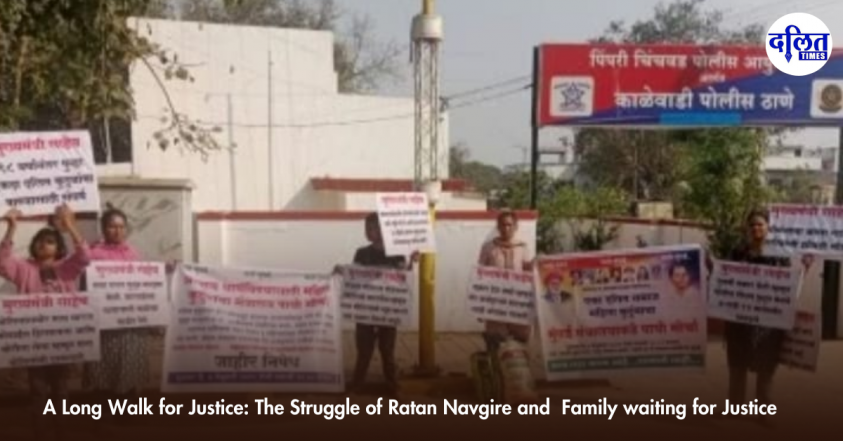With only Rs 70 in hand and a desperate plea for justice, Ratan Navgire, 35 years, her two sisters and two young children undertook an arduous journey of over 150 km from Pune to Mumbai for justice. Carrying posters narrating their plight, they embarked on this journey on February 7 and reached Azad Maidan on February 13, seeking a meeting with Maharashtra Chief Minister Devendra Fadnavis. However, ten days later, their pleas remain unheard, and justice remains elusive.
A Case of Caste-Based Violence and Neglect
Ratan Navgire and her family are residents of Thergaon in Pimpri-Chinchwad and belong to the Matang (Mang) community, a Dalit community that has long been subjected to social marginalization and discrimination. Their ordeal began two years ago when Ratan’s 14-year-old son, Karan, was allegedly brutally assaulted by upper-castes from their neighborhood. The attack was reportedly triggered by Karan’s response to casteist slurs hurled at him, exposing the deep-rooted caste prejudices still prevalent in Indian society.
Following this incident, the family alleges that they have faced relentless harassment. They claim to have been subjected to frequent caste-based insults, threats, and physical assaults by the same perpetrators. The constant abuse has made their lives unbearable, forcing them to flee their home in search of justice and safety.
Also Read : A Long Walk for Justice: The Struggle of Ratan Navgire and Family waiting for Justice
The Fight Against Systemic Injustice
Despite repeated complaints to the local police, the family alleges that law enforcement authorities have been indifferently behave toward them and no action taken. Instead of taking strict action against the accused, the police reportedly failed to provide them with adequate protection or ensure a fair investigation. The Navgire family’s attempt to seek legal recourse has been met with systemic roadblocks, reflecting the broader issue of institutional apathy towards crimes against marginalized communities.
The family’s decision to walk from Pune to Mumbai is a testament to their desperation and resilience. It is not just a physical journey but a symbolic one, highlighting the struggles faced by Dalit communities in accessing justice. Their demand is simple yet profound: a fair inquiry into their allegations, strict legal action against the perpetrators, and protection from further harassment.
The Larger Context: Caste-Based Violence in India
The case of Ratan Navgire is not an isolated one. Dalit communities continue to face systemic oppression, social exclusion, and violence across India. According to the National Crime Records Bureau (NCRB), crimes against Scheduled Castes (SC) have been on the rise, with cases of assault, discrimination, and even murder being reported frequently. However, the rate of conviction remains extremely low, largely due to institutional bias and the influence of dominant caste groups.
Legal frameworks such as the Scheduled Castes and Scheduled Tribes (Prevention of Atrocities) Act, 1989, were enacted to protect Dalits from caste-based violence and discrimination. However, enforcement remains weak, and victims often struggle to get their voices heard in a justice system that is often skewed against them.
Also Read : Caste Discrimination Alleged Against higher officials Manager at Indian Overseas Bank,Kerala
The Need for Immediate Action
The plight of the Navgire family calls for urgent intervention at multiple levels:
- Immediate Investigation and Arrests: The Maharashtra government must ensure a thorough and impartial investigation into the allegations made by the Navgire family. The perpetrators should be arrested and prosecuted under relevant legal provisions.
- Police Accountability: Law enforcement agencies must be held accountable for their inaction. A review of the handling of the case should be conducted, and appropriate action should be taken against officers who failed in their duty to protect the victims.
- Legal and Social Support: The family should be provided with legal assistance, rehabilitation, and adequate security to prevent further harassment.
- Strengthening the SC/ST (Prevention of Atrocities) Act: The implementation of the Act needs to be reinforced, ensuring that Dalit victims receive swift and fair justice.
A Call for Justice
Ratan Navgire and her family’s struggle is a reflection of the deep-rooted caste-based discrimination that persists in Indian society. Their courageous journey serves as a reminder that justice should not be a privilege but a fundamental right accessible to all, irrespective of caste or social status.
The Maharashtra government must act swiftly to address their grievances and set a precedent that crimes against Dalits will not go unpunished. Until then, the voices of the marginalized will continue to rise in protest, demanding the dignity, equality, and justice they rightfully deserve.
It is very shameful to wait for registering case against the culprits they committed caste based atrocities and practiced untouchablity against law and justice. Ratan Navgire and her family is the symbol of many in India experienced caste based atrocities from uppercastes.
(Bindu Ammini, Advocate, Writer & Dalit Activist)



